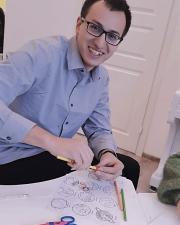Alumni Profiles
Post-Certification
So what happens after you get that TEFL certificate? Learn where our alumni have gone and what they are doing. On these pages, you can read about what previous TEFL candidates have to say on a variety of topics–how they found their current jobs, what they like best about teaching, what they have found challenging, and more.
More about Andrew Jones
My first position as a TEFL instructor was in Moscow, Russia. I taught at a private school and was the head teacher for year 2 students (Ages 6-7). The school later opened a programming course that I also became the instructor for in the upper school where I taught ages 8-12.
I was pretty lucky to get this position as my friend also recently finished a TEFL program and started teaching there. He sent over my resume to them, and they were quick to get me on board. If you were to write and send your resume to the administration at schools in this area they will quickly respond.
I currently work as a Remote HR Consultant for a small company of out Brooklyn, NY. I am talking with some schools in my new home of Bishkek, Kyrgyzstan to find the best fit. Before this, I was an English and Programming teacher in Moscow, Russia. Unfortunately, I decided to leave this school, due to the current political tensions and move to Bishkek to find a new school to work with.
The most challenging aspect for me in this position was the number of kids I worked with. My typical classroom had between 14 and 17 kids. We had nannies for assistance, but most of the time you had to have really good classroom management and disciplinary skills. I also previously had only taught college students during my TEFL program, so teaching young children was completely new to me. However, it quickly grew on me, and I loved working with these children.
My favorite thing about teaching was watching these young kids develop their English skills and actually see the effect you have on them as a teacher. I saw them improve throughout the semester. Students would sometimes come in not even knowing how to read, but with time they quickly started to read and speak freely in the class.
It’s not necessarily teaching-related. However, I had a student lose a tooth once, and she was beyond happy. I was unaware that she left it on a napkin by her notebook on her desk. While my students were in sports class, I saw trash on her desk and threw it away without knowing about the tooth. She came back, and we had quite a scene because her tooth had disappeared! I ended up having to dig through the trash and wash her tooth for her to be happy again.
Absolutely. I think Imposter Syndrome can come hard when you first start. Now, after a short time, I feel very confident in my work after seeing the progress my students made. I think that my creativity for lessons alos increased during my time in Moscow teaching. I learned to approach lessons in many different ways.
Be prepared to not only teach students bot also be a part of their life. That helps boild them into unique individuals and supports them in their upbringing. I always found that I was not only a teacher but a mentor for my students. Also, come prepared with ways to de-escalate situations and methods for classroom management. Finally, something we learned in our KU Certification Program was how to quickly level up or down a lesson. This is way more important than what I origianlly thought because your students will always be on different levels. So, do your best to make sure every child is progressing.
I would recommend reaching out to schools directly by phone or email. Have your resume ready and maybe even a sample lesson plan for the kids you plan on working with. There are plenty of jobs available in Russia, but it may be hard to work there at the oment. Here in my new home, Bishkek, Kyrgyzstan, they are always looking for native English-speaking teachers.
I would mention that, not only are online resources a good place to get ideas and assignments for your class. Your co-workers are going to be a very important part of your career. Become friends with them and, if you need any help with lessons or ideas, they will always help you out. Or, for instance, if you get sick, they will gladly help cover your class.

